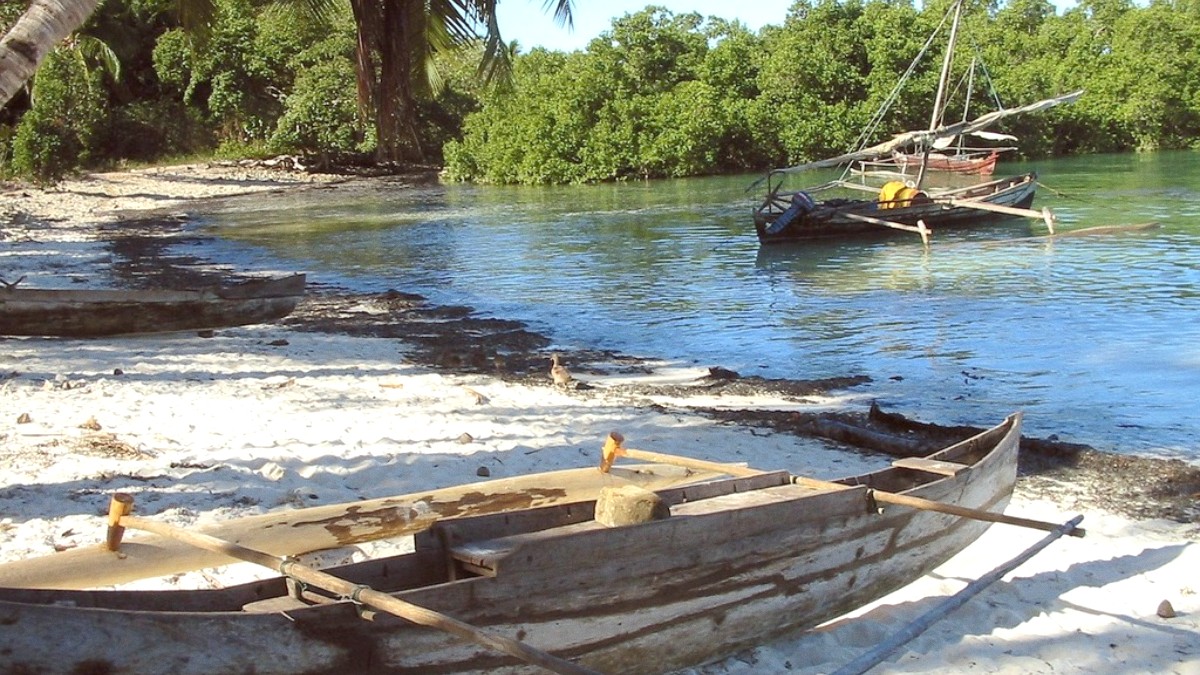
Fresh fish (tuna, reef fish), shellfish (clams, crabs), coconut (flesh, milk, toddy), breadfruit (a staple carbohydrate), pandanus fruit, taro, sweet potato.
Imported items like rice, flour, sugar, and canned meat or fish supplement these.
Flavors are predominantly simple, relying on the natural taste of fresh ingredients.
Coconut milk serves as a flavoring agent, adding richness to many dishes.
Spices are rarely incorporated into traditional cooking, allowing natural tastes to stand out. Saltwater or sea salt is for seasoning.
Raw fish marinated in coconut milk, lime juice, sometimes onion or tomato.
Similar to ceviche. Find at hotels or tourist-oriented restaurants in Tarawa or Kiritimati.
Taro leaves baked in coconut milk, often with corned beef or fish.
Common across the Pacific. Find at local eateries or special occasions.
A staple carbohydrate, prepared baked, boiled, or fried.
Widely available when in season.
A unique preserved snack from pandanus fruit.
Simple desserts with grated coconut and sugar. Fresh seasonal fruit (banana, papaya) as natural dessert.
Very limited. The closest to fine dining is found at higher-end hotels on Tarawa, like Hotel Kitano Kiribati, serving local and international dishes.
Several restaurants associated with mid-range hotels and independent eateries exist in South Tarawa (e.g., Mary's Motel restaurant). Fishing lodges on Kiritimati serve meals as part of their package.
International cuisine is limited. Some hotel restaurants offer basic Western or Asian dishes, like fried rice, noodles, or simple steaks.
Vegetarian options are difficult, traditional diet relies heavily on fish. Meals consist mainly of rice, breadfruit, taro, and simple vegetable dishes. Vegan options are very limited.
Self-catering or pre-arranging meals at accommodation advisable.
Awareness of gluten-free diets or other specific allergies is low. Ingredient lists are not available. Halal and kosher food is generally not available or understood.
Travelers with severe allergies must exercise extreme caution. Bringing essential food is recommended.
No formal classes. Informal learning may occur with local connections.
Limited. Visits to pandanus or coconut groves possible if locally arranged.
Food at local celebrations, Maneaba gatherings, national holidays.
Earth oven (te umu) meals during community celebrations. Fresh toddy from the tree.
Communicate directly with accommodation in advance about dietary requirements.
Bringing snacks and essential food items is recommended for strict dietary needs.
Local options are limited for specialized diets.
Hotel restaurants offer basic Western or Asian dishes like fried rice or simple steaks.
Hygiene standards at street food stalls vary.
No formal classes. Informal invitations to experience local cooking might occur during village or community guesthouse stays.
Opportunities are limited due to atoll agriculture focusing on specific crops.
Food forms a central part of local celebrations like Maneaba gatherings or national holidays.
Feasts with traditional dishes and large gatherings.
A chance to witness significant cultural events.
Celebrations on July 12th often feature widespread traditional food preparation.
Public events during this period are .
Choose locally sourced, non-endangered fish to support healthy marine populations.
Dine at local eateries and buy directly from market vendors to circulate money within Kiribati communities.
Be mindful of plastic and food waste. Avoid single-use items where possible.
The cuisine prioritizes function and sustenance rather than complex flavors or elaborate presentation.